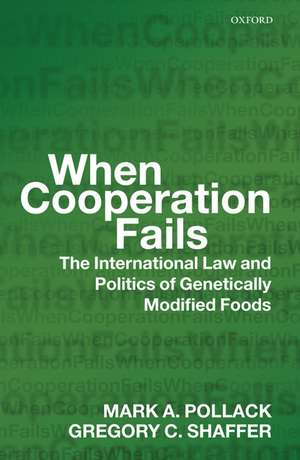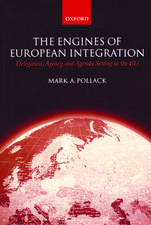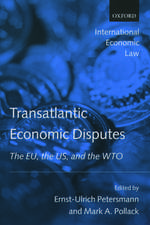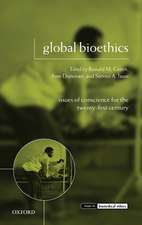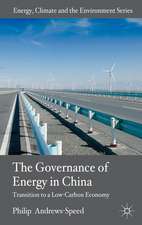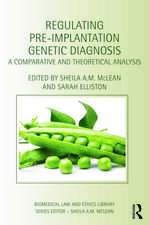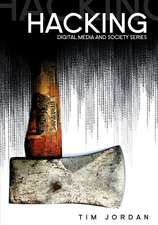When Cooperation Fails: The International Law and Politics of Genetically Modified Foods
Autor Mark A. Pollack, Gregory C. Shafferen Limba Engleză Paperback – 21 mai 2009
| Toate formatele și edițiile | Preț | Express |
|---|---|---|
| Paperback (1) | 268.58 lei 31-37 zile | |
| OUP OXFORD – 21 mai 2009 | 268.58 lei 31-37 zile | |
| Hardback (1) | 617.95 lei 31-37 zile | |
| OUP OXFORD – 21 mai 2009 | 617.95 lei 31-37 zile |
Preț: 268.58 lei
Preț vechi: 294.71 lei
-9% Nou
Puncte Express: 403
Preț estimativ în valută:
51.41€ • 55.86$ • 43.21£
51.41€ • 55.86$ • 43.21£
Carte tipărită la comandă
Livrare economică 09-15 aprilie
Preluare comenzi: 021 569.72.76
Specificații
ISBN-13: 9780199567058
ISBN-10: 0199567050
Pagini: 456
Dimensiuni: 154 x 233 x 25 mm
Greutate: 0.66 kg
Editura: OUP OXFORD
Colecția OUP Oxford
Locul publicării:Oxford, United Kingdom
ISBN-10: 0199567050
Pagini: 456
Dimensiuni: 154 x 233 x 25 mm
Greutate: 0.66 kg
Editura: OUP OXFORD
Colecția OUP Oxford
Locul publicării:Oxford, United Kingdom
Recenzii
an illuminating and methodologically diverse book...not only a rich interdisciplinary dissection of one of the most intractable trade disputes but also a compelling account of the most spectacular regulatory failure of transatlantic cooperation
There is no doubt that this book constitutes a watershed in the literature about the science-politics interface in the international context, and especially in trans-Atlantic cooperation (or lack thereof). The excellent, original, and highly inspiring treatment of this issue, in both theoretical and empirical terms across political and legal disciplines, brings to the fore the deep interdependency in the bilateral, multilateral, and transnational dimensions of the US-EU relations. The five lessons that the authors draw in the concluding chapter open new venues for further research on this matter. But above all, this book is the fruit of a highly successful, tenacious, and systematic research endeavour that provides new insights into this fascinating topic.
The contribution of the work lies in its careful, comprehensive, and ultimately convincing presentation of the arguments...Pollack and Shaffer clearly state that the US and EU regulatory frameworks have been produced in such different ways that they will be resilient to change, even in the face of international pressures, such as WTO rulings. The text contains many facts, a good description, and its scope of research is wide. This book will reward the reader - and cannot be ignored by anyone interested in GMO conflict.
An engaging and thorough study of a seemingly intractablehe international trade dispute...Pollack and Shaffer evaluate the potential outcomes of WTO panel approaches beyond that actually adopted in the US-EU dispute using severalysis methodologies. Their comparative institutional analysis of offers new and important insights into the consequences of what might superficially seem to be a typical question ofs exegesis and international treaties. The book ably reveals the potentially weighty political and institutionalgal consequences of choosing one seemingly technical legaloice interpretation of a treaty over another, and of the choices of treaties identified as those relevant to the dispute.
The book shows the limits of diplomacy and international law in areas of deeply entrenched differences of perceptions and attitudes in a regulatory field. It offers many of the elements that need to be taken into account in moving the matter forward in international law in coming years. It is an excellent piece of analytical research and highly recommended to all working in agricultural biotechnology regulation and beyond.
When Cooperation Fails is a significant, original contribution regarding the transatlantic dispute over the regulation of genetically modified foods and crops. It is an outstanding and highly informative study of the interaction of four global regulatory regimes and the domestic legal and political responses to them. Pollack and Shaffer provide a model for interdisciplinary collaboration.
This book presents an original and an exhaustively researched analysis of one of the difficult and intractable disputes in the transatlantic relationship. It skillfully explores the complex interaction between the national and international dimensions of the GMO dispute in a way that clearly illuminates both the potential and limitations of international regulatory cooperation. Shaffer and Pollack have made a major contribution to our understanding of the legal and political dynamics of regulatory-related trade disputes.
Mark Pollack and Greg Shaffer's When Cooperation Fails is a masterful analysis of the causes and consequences of the failure of transatlantic cooperation as it relates to agricultural biotechnology In short, while specialists in agricultural biotech and transatlantic relations will find When Cooperation Fails 'must-reading', the book should also be engaged by a wide range of specialists in international law, politics and political economy.
There is no doubt that this book constitutes a watershed in the literature about the science-politics interface in the international context, and especially in trans-Atlantic cooperation (or lack thereof). The excellent, original, and highly inspiring treatment of this issue, in both theoretical and empirical terms across political and legal disciplines, brings to the fore the deep interdependency in the bilateral, multilateral, and transnational dimensions of the US-EU relations. The five lessons that the authors draw in the concluding chapter open new venues for further research on this matter. But above all, this book is the fruit of a highly successful, tenacious, and systematic research endeavour that provides new insights into this fascinating topic.
The contribution of the work lies in its careful, comprehensive, and ultimately convincing presentation of the arguments...Pollack and Shaffer clearly state that the US and EU regulatory frameworks have been produced in such different ways that they will be resilient to change, even in the face of international pressures, such as WTO rulings. The text contains many facts, a good description, and its scope of research is wide. This book will reward the reader - and cannot be ignored by anyone interested in GMO conflict.
An engaging and thorough study of a seemingly intractablehe international trade dispute...Pollack and Shaffer evaluate the potential outcomes of WTO panel approaches beyond that actually adopted in the US-EU dispute using severalysis methodologies. Their comparative institutional analysis of offers new and important insights into the consequences of what might superficially seem to be a typical question ofs exegesis and international treaties. The book ably reveals the potentially weighty political and institutionalgal consequences of choosing one seemingly technical legaloice interpretation of a treaty over another, and of the choices of treaties identified as those relevant to the dispute.
The book shows the limits of diplomacy and international law in areas of deeply entrenched differences of perceptions and attitudes in a regulatory field. It offers many of the elements that need to be taken into account in moving the matter forward in international law in coming years. It is an excellent piece of analytical research and highly recommended to all working in agricultural biotechnology regulation and beyond.
When Cooperation Fails is a significant, original contribution regarding the transatlantic dispute over the regulation of genetically modified foods and crops. It is an outstanding and highly informative study of the interaction of four global regulatory regimes and the domestic legal and political responses to them. Pollack and Shaffer provide a model for interdisciplinary collaboration.
This book presents an original and an exhaustively researched analysis of one of the difficult and intractable disputes in the transatlantic relationship. It skillfully explores the complex interaction between the national and international dimensions of the GMO dispute in a way that clearly illuminates both the potential and limitations of international regulatory cooperation. Shaffer and Pollack have made a major contribution to our understanding of the legal and political dynamics of regulatory-related trade disputes.
Mark Pollack and Greg Shaffer's When Cooperation Fails is a masterful analysis of the causes and consequences of the failure of transatlantic cooperation as it relates to agricultural biotechnology In short, while specialists in agricultural biotech and transatlantic relations will find When Cooperation Fails 'must-reading', the book should also be engaged by a wide range of specialists in international law, politics and political economy.
Notă biografică
Mark A. Pollack is Associate Professor of Political Science at Temple University, where he teaches classes in international relations and European Union politics. He received his Ph.D. from Harvard University in 1995. He has also taught at the University of Wisconsin-Madison (1995-2004) and was Senior Research Fellow in the transatlantic relations program at the European University Institute in Florence, Italy (2000-2002). His research agenda focuses on the role of international institutions in the regional and global governance, with specific projects examining the delegation of powers to the supranational organizations in the European Union, the creation of new mechanisms for the governance of the transatlantic relationship, the global governance of genetically modified organisms, and the "mainstreaming " of gender issues in international organizations. Professor Gregory Shaffer is Melvin C. Steen Professor of Law at the University of Minnesota Law School. He was previously Professor of Law at the University of Wisconsin Law School, where he was also Director of the University's European Union Center and Co-Director and Senior Fellow of its Center on World Affairs and the Global Economy, and the inaugural Wing-Tat Lee Chair of International Law at Loyola University Chicago School of Law. Professor Shaffer is a recipient of two US National Science Foundation Law and Social Science grants for his work on the World Trade Organization, a Fulbright Senior Research Scholar for his study of transatlantic regulatory conflict and cooperation, and a Senior Research Fellow at the International Centre on Trade and Sustainable Development for its work on WTO dispute settlement and developing countries.
